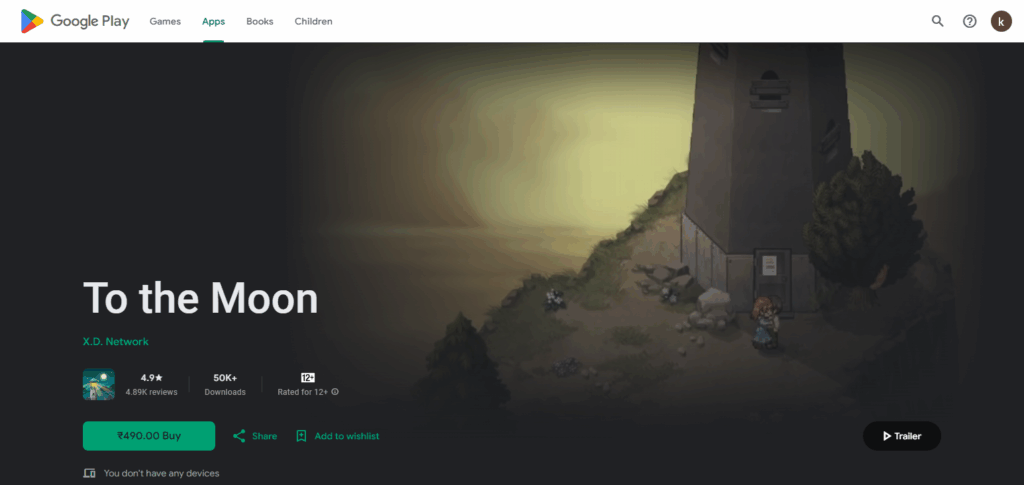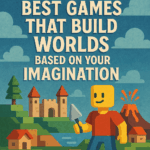In this article, I will cover The Best Dialogue-Only Games With Emotional Depth, focusing on how impactful storytelling does not always necessitate action.
These titles stand out for their use of dialogues, poignant choices, and interactions to present challenging and unforgettable character dynamics.
Each heartwarming story or thought-provoking journey stands as a testament to how dialogue and conversations can offer a player’s lasting emotional experience.
Key Point & Best Dialogue-Only Games With Emotional Depth List
| Game Title | Key Point |
|---|---|
| Signs of the Sojourner | A narrative card game where dialogue is shaped by deck-building mechanics. |
| Road 96 | A procedurally generated road trip with branching paths and political themes. |
| The Red Strings Club | Cyberpunk story exploring ethics, emotions, and corporate manipulation. |
| Coffee Talk | A chill visual novel set in a fantasy café, focused on listening and empathy. |
| Disco Elysium | Deeply philosophical RPG driven by dialogue, choices, and inner voices. |
| To the Moon | An emotional, story-rich RPG about memories and fulfilling a dying wish. |
| Emily Is Away | A nostalgic chat-based story told through a 2000s-style instant messenger. |
| Night in the Woods | A narrative platformer exploring depression, friendship, and small-town decay. |
| Life is Strange | A time-bending episodic drama about choices, relationships, and consequences. |
1.Signs of the Sojourner
Signs of the Sojourner is remarkable in its own right as it is regarded as one of the best dialogue-driven games with emotional depth.

This is due to its unique card based conversation system which contrasts to human relationships. Instead of employing a dialogue tree like in many other games, players use decks which evolve over time, akin to personal growth and external influence.
This mechanic not only determines story outcomes but also depicts the emotional burden of miscommunication in effectively every interaction, which is often bittersweet as connections strengthen or weaken in relation to one’s choice of “speech.”
Pros & Cons Signs of the Sojourner
Pros
- The card-based dialogue system is an innovative reflection of emotional and communication development.
- Relationships and story advancement results from dialog exchanges.
- Different styles of communication create replay value when trying to replay the game.
Cons
- The abstract mechanics might be complicated to some players.
- Emotional weight can be difficult to bear.
- The game’s limited traditional mechanics may not sit well with players who prefer fast-paced action.
2.Road 96
Road 96 earns its place among the best dialogue-only games with emotional depth by offering a journey through a dialogue driven self-discovery, self-reflection, politcal awakening, and survival.

Everything in the game is procedural and every dialogue choice is of paramount importance in shaping the broader narrative. It is a story of oppression, freedom, and identity. Apart from the unique procedural system, the game shines through the humanization of every dialogue; encounter, whether humorous, tense, or tragic, is presented with deep spoken words, weaving a tapestry of stories and experiences that are deeply personal and multifaceted.
Pros & Cons Road 96
Pros
- The diverse characters create powerful political and emotional themes.
- Strong emotional and thematic elements are present across diverse characters.
- Replayable due to different characters and endings.
Cons
- The randomization can cause gaps in the overall story.
- The dialogue does not have a lot of depth in shorter phrases.
- Players looking for linear, straightforward progression won’t find much to enjoy.
3.The Red Strings Club
The Red Strings Club is arguably one of the greatest emotionally rich dialogue-only games as it examines humanity using a conversational framework, philosophy, and moral complexities. Players take on a role of a bartender who serves as an emotional influences with the help of drinks, sparking dialogue revolving around one’s identity, mental health, and free will.

Combat or puzzles in the game worlds are replaced with subtle interactions between people which form the backbone of the game’s greatest themes as its dialogues strip away artificial layers of its characters and reveal vulnerabilities in brutal honesty.
Pros & Cons The Red Strings Club
Pros
- Engages players with moral dilemmas without combat.
- In combat-less ways, players are confronted with moral dilemmas, such as unique emotional character mechanics like bartending.
- Strong moral dilemmas addressed with inaction.
Cons
- The short playtime does not provide time to delve deeply and meaningfully into its themes.
- The game’s static, dialogue-heavy style will not appeal to some players.
- Uncommon appeal owing to its cyberpunk philosophical feel.
4.Coffee Talk
A standout entry in the dialogue-only recreation genre, the deeply emotional Coffee Talk, takes place in a late-night cafe where players serve fantasy creatures drinks as they share their struggles.

The game’s most impressive aspect is its ability to elevate love, prejudice, loneliness, dreams, and other heavier themes into simple, grounded conversations. Players steer stories by empathetic listening and drink preparation, providing a safe emotional environment where words are significant. The game’s methodical rhythm and deep, personal plotlines allow for every dialogue to be raw, tender, and incredibly human.
Pros & Cons Coffee Talk
Pros:
- Chill environment and relatable conversations.
- Good character development in casual storytelling.
- Aesthetics and music serve to immerse the player emotionally.
Cons:
- Limited to interaction involving drink preparation.
- Slow pace might not appeal to all players.
- Reduction in narrative branching seems to lower replay value.
5.Disco Elysium
Disco Elysium exemplifies emotionally resonant dialogue-driven games by providing an introspective narrative told through conversation. The game’s dialogue is accentuated by its most distinctive feature; the protagonist’s inner dialogue with splinters of his psyche, Logic, Empathy, Authority, and others, each having an effect on the decisions made and morals held.

This form of narrative reveals clusters of failure, identity struggles, addiction, and concepts of redemption. By using text to articulate conflict and strife, the game allows players to grapple with their complexities. This makes each interaction profoundly personal and emotionally resonant.
Pros & Cons Disco Elysium
Pros:
- Inner thoughts and traits and dialogues are rich and layered.
- Tackles themes such as addiction, failure, and identity.
- High replay value due to various character builds and moral choices.
Cons:
- Heavy dialogue may be overwhelming to casual players.
- Not all mature themes are acceptable for younger audiences.
- Requires some level of patience for slow storytelling.
6.To the Moon
To the Moon is one of the standout games which uses dialogue as a your most basic form of communication while retaining the crucial deeper emotional sense of gameplay since the story is played out through a series of memories. It revolves around two doctors who try to change a man’s memories to fit his whims.

The game is devoid of any fighting and uses combat sparingly. It uses the bare minimum of mechanics and combat, focusing only on dialogue and narrative. Its unparalleled strength lies in the gradual revelation of love, remorse, and unexpressed hurt.
Pros & Cons To the Moon
Pros:
- A narrative that is highly emotional and heartwarming.
- Strong character and narrative despite simple gameplay mechanics.
- Focus on emotional impact means no filler content.
Cons:
- Limited to minimal gameplay interaction.
- Limited replay value due to a linear structure.
- Outdated graphics may not appeal to everyone.
7.Emily Is Away
Emily Is Away stands out as one of the most poignant dialogue-centric games that evoke emotions, nostalgia, and the rawness of teenage relationships unfold over a simulated instant messenger from the early 2000s. It captures the essence of adolescent relationships in a uniquely powerful way.

Digital communication is portrayed through pauses, message deletions, and shifting text tones which portray emotions and distance. Players relive the sadness of unfulfilled relationships as they navigate through text-based conversations spanning several years, each decision feels simple yet eternally significant.
Pros & Cons Emily is away
Pros:
- Evocative of a certain time period and resonates emotionally.
- Accurate depiction of online relationships and growing apart.
- IM format is a novel and unique way to tell a story.
Cons:
- Very brief play sessions.
- Lack of interaction might be seen as restrictive.
- Restricted scope beyond chat simulation.
8.Night in the Woods
Night in the Woods is one of the best—if not the best—dialogue-only games with emotional depth for its impactful take on mental health, economic struggle, and drifting through life. Players aid Mae, a college drop out in a fading town, through her introspective, gently humorous, and often poetic conversations with her friends who are unique and deeply flawed.

The game captures Mae’s internal struggle with its striking balance of humor and sadness—light and dark. It offers a rich emotional landscape through simple conversations and quiet reflection. Mae’s journey captures the vulnerability of youthful confusion in understanding one’s self after human experience.
Pros & Cons Night in the Woods
Pros:
- The themes of mental health, identity, and coming of age are explored in-depth.
- Character dialogues are authentic and the characters are memorable.
- A blend of humor, mystery, and emotion.
Cons:
- The slow pace may put off gamers that prefer more action-focused content.
- The platforming portions of the game, while present, are not very interesting.
- Engagement is necessary in order to grasp the investment in the characters’ profundity.
9.Life is Strange
Life is Strange is renowned as an emotionally profound game, expertly incorporating supernatural elements into real-world challenges. Players assume the role of Max, a girl with the ability to rewind time, and as a teenager, she navigates friendships, trauma, and identity in a coming-of-age tale through a web of conversations that unlock multiple outcomes.

The game’s strength is how it delves into the impact of selection—not merely on the story, but on human connections and character development through dialogue—and in this case, every moment is laden with moral complexity and emotional resonance in how it captures unfiltered truth.
Pros & Cons Life is Strange
Pros:
- The story is emotionally gripping and is crafted through player choice.
- Engaging character arc and relatable teenage drama.
- A time rewind tool enriches dialogue and decisions.
Cons:
- Some lines of dialogue are delivered in an awkward or overly scripted manner.
- In the later episodes, some of the diverging choices will come to a central point.
- Highly emotional content may not appeal to some players.
Conclusion
As we have seen, the most impactful dialogue-only games combine emotional depth with character-driven narratives that examine the human condition, often in ways that are impossible to forget.
These games capture the spirit of human interaction and meaningful engagement through non-violent, often mechanics-free encounters framed within genuine dialogue. Empowering a player to defeat inner demons, unravel complicated relationships, or discover hidden facets of themselves, each title invites players along a masterfully crafted emotional odyssey in crafted or unfeigned discourse.
FAQ
What are dialogue-only games?
Dialogue-only games focus primarily on conversation and narrative rather than action or traditional gameplay mechanics. Story progression relies heavily on player choices during dialogue.
Why are these games emotionally impactful?
These games explore deep human themes like loss, identity, mental health, and relationships. Dialogue allows players to connect emotionally with characters and influence story direction in personal ways.
Do I need fast reflexes or gaming experience to play these?
No. These games are accessible to all players. Most use simple point-and-click, choice selection, or light mechanics that prioritize storytelling over skill.









